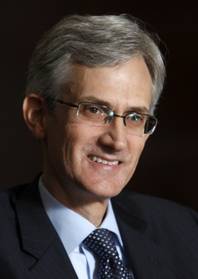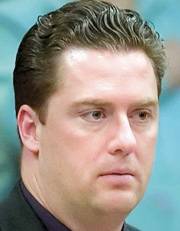Friday, Aug. 27, 2010 | 2 a.m.

Rory Reid
Related document
Sun Coverage
Sun archives
- Rory Reid’s budget plan: Cut and consolidate but don’t raise taxes (8-26-2010)
- What will voters hear when Rory Reid, Brian Sandoval debate? (8-25-2010)
- What schedules can say about the candidates for governor (8-15-2010)
- No more Mr. Meek: Reid forces Sandoval’s hand with challenge (8-12-2010)
- Rory Reid draws Brian Sandoval into short debate (8-11-2010)
- Sun puts Brian Sandoval, Rory Reid in the hot seat (8-1-2010)
- Candidates for governor answer questions carefully and with few specifics (8-1-2010)
- A comparison of the gubernatorial candidates’ education plans (7-7-2010)
- Brian Sandoval, Rory Reid spar over budget solutions (1-27-2010)
The policy wonks’ criticism of Gov. Jim Gibbons is that he entered office assuming a bloated state government and proceeded to thrash around with a meat cleaver, indiscriminately ordering cuts.
Rory Reid has seemed to out-Gibbons Gibbons.
The Democrat running for governor proposed Thursday a conservative budget that calls for no new taxes and instead favors hundreds of millions of dollars in cuts and consolidations, mostly targeting what he believes are engorged Carson City bureaucracies.
It also makes the generous assumption that economic development will lead to higher-than-expected revenue. Raising the eyebrows of independent economic analysts, Reid said he thinks the state will get $615 million more in revenue than legislative and executive branch budget forecasters predict.
Even if Reid’s plan has flaws, it’s nonetheless the first stab at how a major candidate for governor will deal with the job’s most pressing issue: balancing a budget with a $2.5 billion to $3 billion hole.
Brian Sandoval, the Republican nominee, has not released his plan, although he maintains he won’t raise taxes. His campaign has refused to provide even a vague timeline of when he will release his proposal.
Reid said in an interview there would be layoffs, but he wouldn’t estimate how many.
He said he would try to protect rank-and-file employees. “There are too many administrators doing the same thing in Carson City.”
When asked to cite examples, he pointed to consolidations he had done among Clark County housing authorities. When pressed for state examples, he listed the Economic Development Commission, the Business & Industry Department, the Tourism Commission and the Cultural Affairs Department. Among “those agencies, I think there are people there who try to pursue the same kinds of activities,” he said.
Studies find that Nevada government has some of the fewest employees per capita in the country.
Despite this, the start of each administration is heralded with promises to fundamentally reform the way the state does business.
Former Gov. Bob Miller knows firsthand how difficult it is to implement a significant government reorganization. He spent months studying the issue and then trying to persuade lawmakers to go along with his proposals.
He said it would be difficult for Reid to immediately institute reforms.
“He’ll find out that many of these entities have their own constituencies and when you try to proceed into the legislative session, you’ve got to make a very strong case,” Miller said.
Miller, however, doesn’t think this budget crisis can be solved without a tax increase.
“At some point in time, the numbers that are out there are going to indicate we’ll probably need some additional revenues from some place,” he said.
Gibbons’ Deputy Chief of Staff Lynn Hettrick called the Reid budget “insulting to the public and people who are working here.”
Hettrick, the former Republican Assembly minority leader who lead the conservative bloc that obstructed Gov. Kenny Guinn’s tax proposal in 2003, said state government “is pretty lean.”
He called Reid’s plan “an election piece, not a budget.”
Among ideas in Reid’s plan is a 10 percent across-the-board cut to save $680 million.
Gibbons’ staff pointed out some problems with that.
• Reid proposes taking $100 million from the state’s transportation fund to balance the general fund budget. The Nevada Constitution prohibits taking money from the highway fund.
• The Gibbons administration said some cuts would have harsh consequences. Reid proposes a 33 percent cut — $150 million — in the state’s Corrections Department. What effect would that have? Gibbons’ budget director, Andrew Clinger, says a 10 percent cut in the department’s budget would require the release of 3,000 inmates.
• Reid proposed consolidating 26 agencies into 16, and cutting those budgets. He proposed 50 percent cuts in programs such as the fight against a nuclear waste dump at Yucca Mountain.
• Other proposals, such as trying to take care of the sick and elderly in their homes instead of nursing homes, are standard procedures.
• The footnotes to Reid’s plan include examples of budget savings in other states. The Gibbons administration said there’s no guarantee those savings could be realized here.
• Reid also enlisted many of the ideas from Gibbons’ Spending and Government Efficiency Commission. Hettrick said many of those proposals have been implemented, were in the process of being implemented or just didn’t pencil out.
With an anti-government mood sweeping the electorate, Reid’s plan proves that he is willing to aggressively cut the cost of providing government services, even to the point of laying off employees.
And that could help support calls from lawmakers and others to raise taxes to preserve essential services.
“Certainly with the budget crisis we have, it is important that the public recognize or believe and be convinced that everything is being done to reduce the cost of government,” Miller said.
Assembly Majority Leader John Oceguera, D-Las Vegas, agreed. He said it is too soon to talk about raising revenue.

John Oceguera
“He’s opening up the dialogue,” said Oceguera, who’s in line to be the next Assembly speaker. “Some of the things he’s talking about are what we’ve done, are doing or looking at doing in the future.”
He said talks about revenue should come after the public “knows we made government more efficient, more accountable.”
(Senate Majority Leader Steven Horsford, D-Las Vegas, and the Republican leaders in the Assembly and Senate have acknowledged that taxes will have to be raised.)
Few analysts were willing to back up Reid’s optimistic assumption that the economy will improve enough to inject $615 million into the budget in 2012.
John Restrepo, principal analyst of Restrepo Consulting Group, said national economic indicators do not prove a rebound is in the works.
“It’s possible that Nevada’s economy will begin to see some growth again in the next two years,” he said. “The question really is how robust will that growth be and how long will it take to positively impact state revenue.”
Restrepo sits on the Economic Forum, the committee of business leaders that predicts before every legislative session the amount of revenue the state will have over two years. The governor and Legislature are obligated to use that amount in building the budget.
Reid is on the right track by proposing aggressive policies to turn around Nevada’s troubled economy, analysts said. But the results probably won’t be realized immediately.
“If he’s saying the economy will rebound and plug $615 million into next year’s budget, I don’t think he can do that,” said Carole Vilardo, president of the Nevada Taxpayers Association. She added that Reid’s economic policies would generate economic growth to aid future budgets.
Guy Hobbs, managing partner of the financial consulting firm Hobbs, Ong and Associates, said it isn’t unusual for planners to build an optimistic economic scenario into their plan. Careful planners, however, always include a contingency.
“We always had a fallback plan,” said Hobbs, a former Clark County finance director.
Vilardo, along with others, gave Reid credit for the guts to open the debate on the largest challenge facing state policymakers: balancing the budget.

Join the Discussion:
Check this out for a full explanation of our conversion to the LiveFyre commenting system and instructions on how to sign up for an account.
Full comments policy